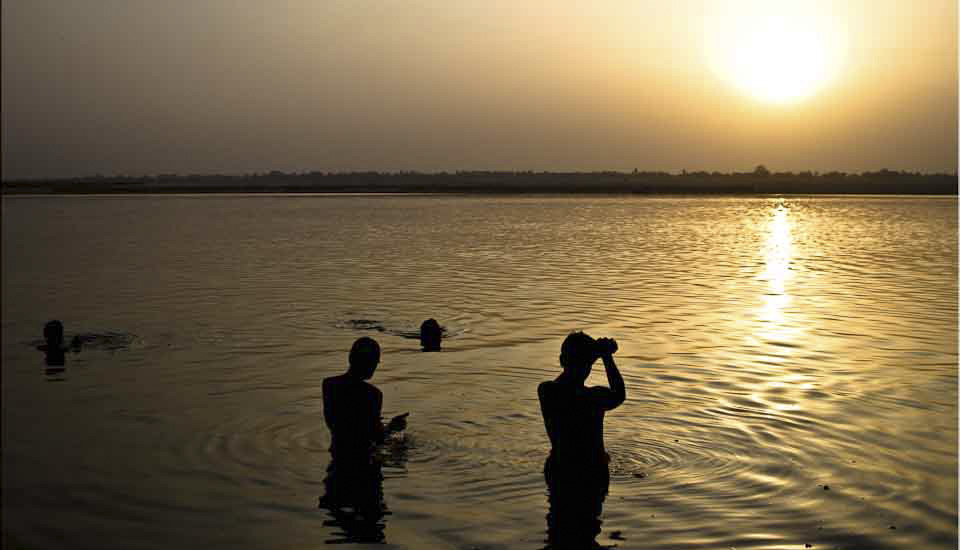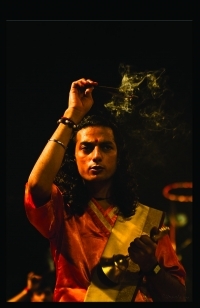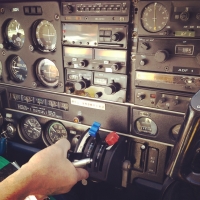.jpg)
Sunset on the Nile
The Middle East is the birthplace of the major Abrahamic religions, and it is no surprise that symbols important in Judaism, Christianity, and Islam abound. Our Nile riverboat featured a hamsa or khamsah: a hand with the fingers spread apart to ward off evil; with a star and crescent, representing Islam, off the thumb; and crowned by the word “Allah” in Arabic.
You could be nowhere else…
The songs of Imams on the hot, heavily scented air, are calling you to prayer. The hawkers and beggars lining the streets are noisily entreating you into the bustling markets. The tourist boats rafted on the river are enjoining you to travel back to colonial times …
A Nile riverboat, chugging upstream from Luxor to Aswan in Egypt, was my home for four nights. As I sat on the upper deck with a late afternoon G&T, watching the sun go down over the palm trees and settlements along the banks, I felt transported into another era. I only needed a pith helmet or a long cigarette holder to take my place as an extra in an Agatha Christie story. There is something vaguely disorienting about being in a place that is at once so foreign, and – thanks to movies and books – so familiar.
After a morning spent exploring Karnak Temple (see: In Worship of Ancient Gods), I had just enough time to wander some of the market streets in Luxor before our boat set sail. I’ve said it before: I love markets. They give the visitor a glimpse into the real, everyday-world of a place.
Photographically, markets are always difficult in terms of their lack of light and space, but that is part of the challenge and the fun! What always surprises me is people’s willingness to have a cheerful exchange with someone who doesn’t speak their language, and to have their pictures made for no reward other than a smile and a shukraan lak.
The Nile River has a mythology all its own. Nicknamed “the father of African rivers,” it is held to be responsible for the development of Egyptian civilisation. Herodotus (c. 484 – 425/413 BCE), who is called the father of history, wrote that “Egypt was the gift of the Nile”. Every year the river would flood, overflowing its banks and depositing new layers of nutrient-rich silt. This made the lands either side of the river very fertile, allowing the Ancient Egyptians to become rich from their agriculture. They paid tribute to Hapi, the God of the annual floods, and their calendar followed the river’s three seasons: Akhet (June-September), the flood season, Peret (October-February), the growing season, and Shemu (March-May), the harvest season.
Join me on a 30 million-year-old waterway, where time loses meaning.
.jpg)
Fruit Seller
In spite of the heat, the crowded spaces, and the noise, most of what I see in Luxor is fresh and clean.
.jpg)
“The Best Bread”
There is nothing like freshly baked loaves, hot out of an oven! It smelled as good as it tasted.

Live Birds
Stuffed pigeon is a delicacy in Egypt; the birds are specially bred for market.

Woman in Black
The vendors are smiling and welcoming – even though they know I’m not likely to buy anything.

Market Corner
From fruit to fresh fish: all manner of foods are on display on the streets.

Fish Sales
Of course, chatting and bargaining is a big part of the social heart of any market.

Persimmons

Man in the Laneway

Fabric Store Shopkeepers
It is dark in the narrow streets and crowded shops – but nothing could dim the light of these two delightful young men. (iPhone6)

Portrait of an Egyptian Shopkeeper

Women’s Clothing
All the sales-people seem to be men – even the attendant at this tightly packed women’s clothing store! Note the colourful bras hanging on display.

Women in Black Abayas
There are plenty of women shopping, however, and they leave the market with loads piled on their heads.

Bridge over the Nile
As our riverboat pulls out, we get a nice view of Luxor Bridge and its decorated pylons. (iPhone6)

On the Nile
Simple brick housing complexes and palm trees slide past as we make our way south, up-river.

Riverboats on the Nile
The river is full of ships – some adding greatly to the haze and pollution in the air. We are all heading the 53 kilometres (about 33 miles) up-river to Esna. There we will all have to wait – possibly for hours – for our turn through the locks. It is still shoulder season, and tour operators say they haven’t fully recovered from the aftermath of the Arab Spring. This leads me to wonder how busy and polluted this area must be in a good high season!

Twilight on the Nile
The afternoon draws to a close and the riverboats continue.

Upper Deck of a Riverboat
Our boat is time-worn and comfortably shabby around the edges, but sunset bathes the upper deck, disguising the badly-laid artificial grass that passes for carpet.

Sunset on the Palms
As our boat slips into night, we are called down to dinner, where we are served by liveried staff. Once again, I feel as if I’m living in a dream or an old movie.
Being on the water has that soporific effect – especially on a timeless river like the Nile.
Lucky, really, as it was well after dark when we reached the Esna Locks and we did wait several hours before making our way through.

But, we had nowhere better to be!
Until next time,
Safe sailing!
Photos: 08October2019























.png)


[…] started my day at Edfu, after sailing up from Luxor the day before (see: Luxor Bazaar and the Mighty Nile). We’d spent the day chugging up-river, watching the banks with their rich farming lands and […]